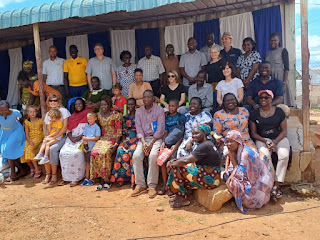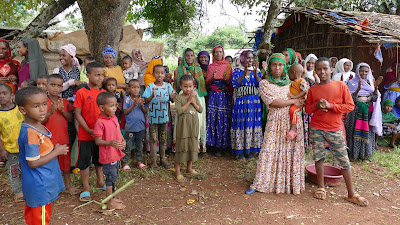 |
| Les Sables Blancs after the storm |
When we returned, it was the weekend before David's fall break. Even though we had been out of the office for a week, we decided it would be good to take our RRL leave for the following 5 days while David was out of school. We had Monday back in the office to deal with the most urgent work stuff and then headed out on Tuesday.
One of our favorite leisure time activities we enjoy is snorkeling. Since most of the East African coast sits on a coral reef we have a number of choices including places on the coast of Kenya, like Mombasa or Malindi. Zanzibar is also a favorite and our default go-to vacation spot. Unfortunately, plane tickets have been pretty expensive to go there of late.Last year we decided to try a place that sounded promising: Djibouti. It is very close by plane, about an hour away, and pretty cheap to fly. In fact, we could go there with our air miles. We WhatsApped the place we stayed before and booked a reservation at Sables Blancs, a very remote guest house on the beach just a few kilometers north of a small town called Tadjoura. We stayed there last year and loved it because of the incredible snorkeling one can do just off the beach.
 |
| Meeting of two tectonic plates |
Its biggest claim to fame currently is a gigantic port that provides a huge amount of goods to Ethiopia and other inland countries. This is evident when one arrives and sees the enormous number of Ethiopian trucks on the roads or parked in huge lots around an enormous shipyard full of container-laden ships.
The main urban center, Djibouti city, had a number of hotels and restaurants, both Ethiopian and Yemeni. It is also like a little Dubai with a number of malls and places where one can buy imported goods virtually duty-free. This was a great perk of going there: we could load up on things like cheese, chocolate, and other delicacies not available in Ethiopia for less than $80.For all these reasons we were happy to give it another go, and arrived on a Tuesday morning. To get to our hotel, which is across a rather large inlet (28 kms across) one can take a boat straight across (3 hours) or a Landcruiser around the coast (3 hours). We had planned on the boat but were told there was some concern about the weather so we took the Landcruiser.
Honestly, when we arrived the sky was cloudless and about 90 degrees (35 C). We stopped at a mall, stocked up on some snacks for the week at the guest house, and headed out by car. The trip is actually quite interesting. One starts by driving on the road that goes to Ethiopia and is in line with many trucks. Eventually, you break off to the North and the trip is sublime, with endless hard rock desert in every direction. There is a place where there is a huge wind farm, another area that is several kilometers of black magma, that looks like you are on the moon. You cross the fault line where a continental shelf is slowly separating from Africa. There are huge caverns of solid magma coming out of the ground there. Then you pass an enormous salt lake, (Lac Assal) the lowest place on the African continent; it looks like an enormous white sand beach, but it is all salt. You also drive along a number of high cliffs that look down on clear blue sea.What to do there: I will say there is no place in the world I have snorkeled which has such extensive, accessible coral reefs. From one's room, you can walk 10 meters to the shore, put on flippers, snorkel, and mask, and swim another 20 meters, and find the edge of the reef that extends in each direction of a huge bay for as far as one could swim and even beyond. The variety of fish is staggering, as well as huge moray eels, barracuda, and sea turtles.
In a sadly ironic turn of events, my GoPro had to be replaced and was in the US, so we did not have it for this trip. I wish I had underwater pictures to show. I think we went snorkeling about 4 times a day. Unlike Mombasa or Zanzibar, you can pretty much go out in high or low tide, the water is always calm and there is no significant current. I think the coolest fish we saw that we had never seen before was the Indian ocean crocodile fish. It really looked like a crocodile sitting on the bottom of a sandy spot on some broken coral. It was at least 1.5 m long (This is a stock photo here. https://en.wikipedia.org/wiki/Tentacled_flathead#/media/File:Pez_cocodrilo_(Papilloculiceps_longiceps),_parque_nacional_Ras_Muhammad,_Egipto,_2022-03-27,_DD_71.jpg)When we weren't snorkeling there were a lot of places to walk along the beach. Much of it is on rocks, that look like cooled magma. There are a number of inlets along the bay going one direction. David and I fished a number of times as we brought our rod and reel. We caught fish on almost every single cast, with any bait or even a small lure. They were small fish, juvenile groupers, and snappers, were the main ones. We weren't fishing to eat, we just wanted to see what we would catch. I was hoping for a barracuda but never got anything big off the shore. Walking in the other direction, one mounts the escarpment which offers a commanding view of the strand of beach. David liked to go up there and look for geodes. He crushed open a number of rocks but did not ever find one. All the rocks up there are volcanic, or better described as magma, as there is no evidence of mountains in the vicinity. On the second night, we heard it start to rain and on the 3rd day morning, we had a torrential downpour that lasted most of the morning. I could not believe how hard it rained in such a short time. It flooded our room and the hotel moved us to a new one (the room was not badly flooded, but they had spare rooms as we were alone.) When the weather cleared we saw that the ocean had been pretty churned up and a lot of dirt had run into the bay. Also, it looked like some garbage from Tadjoura had spilled into the ocean as well and we could see some plastic bottles floating around. We guessed that this kind of heavy rain was not common and had flooded some places. We really got an idea of just how much rain had fallen when we walked up the small road that led up to the escarpment. The driveway down was almost completely destroyed. There was no gravel layer, it was just a string of large exposed stones and boulders, almost impassable by vehicle.Nonetheless, by afternoon the dirt in the water had settled and we were able to snorkel again. For the next two days, it rained some in the morning, but nothing like that 2nd night. We enjoyed all the activities we had been doing every day.
 |
| Rooms at the hotel |
In the evenings we played games with David or listened to an audiobook. We also enjoyed reading. One cloudy morning we broke out our paints, which we always bring on vacation, and did a morning doing watercolors (or guache/acrylic). I tried to capture a particularly interesting rock formation I saw that looked like a colonial soldier with a tri-corn hat, hunched over with a great coat on, looking down at the ocean. I have included the original scene as well as my rendition for your critique.
There was no internet connection except a SIM card I had for emergencies, but otherwise, we were really cut off from everyone. Strangely, that sense of isolation in such an isolated place was a welcome feeling.
On our last day, we had some concerns about how we would leave. We had booked a car, but saw that the road coming down the escarpment was still impassable. Sure enough, on the morning we were to leave, a small boat came and took us and our luggage from the beach to the nearby town of Tadjoura where our ride was waiting at the dock. I was relieved there was a plan B if one could not travel by road. On the drive back we met a stunning sight, it was nothing like our drive there, for almost half the trip we crossed over dozens of places where the road had been destroyed by floods that had rushed down during the big rain. Tadjoura was flooded as well, and when we got to Djibouti city, it was very evident that much of it had been underwater for a day. The place was completely littered with garbage and debris displaced by flooding.Our driver explained to us that a cyclone had hit nearby Yemen and the tail of it had crossed Djibouti. The one morning of heavy rain where we were, had devastated much of the country. I could not believe it was not more evident where we were. But I guess it was mostly rock around Sables Blanc, so not much to move.
We stopped for lunch at a Yemeni restaurant for some great fish and galettes, then at the mall one more time, after settling our bill at the in-town office for the hotel. We loaded up on supplies and took an evening flight back to Addis. We felt quite refreshed and arrived back Saturday night. Fortunately the weekend before our arrival, we had done some preparation for the weekend of our return. I had to teach Sunday school the next morning, but then in the afternoon, we had David's 15th Birthday party! I had made a piñata the weekend before. This is a birthday tradition for the kids and between the two of them I have made about 30. This year I made a Minecraft Creeper. This is the 3rd year in the Minecraft theme, mainly because I only have cereal boxes to work with so everything has to look a bit boxy.David had his cadre of friends over that he really likes--several other boys that he hangs out with regularly, with a couple of siblings along. The adults hung out together while kids played--spike ball mainly, then they did the piñata, sang Happy Birthday, ate cupcakes, and David opened presents. All the kids brought costumes as well, as there was a Halloween party at the SIM compound down the road from us where one of the families that came, live. All the kids went down there after the party to trick or treat. It is an annual tradition at the SIM compound to do this since it is an enclosed area of houses that is safe for walking around.
David and Bereket came back loaded with candy and had a great time. David got some really fun games at his Birthday as well that we have tested out in the last week.
The biggest thing happening at work these days is buying a new Landcruiser (imported from Djibouti.) Second biggest thing was interviewing four candidates for our young adult exchange program. Third biggest, finally selecting a contractor to renovate our hall bathroom and get rid of the black mold. Lots of construction dust in our future. We've been clearing the decks all day today. Yesterday we hosted youth group, and probably won't be able to offer much hospitality for a few weeks coming up. Hopefully, we will have an update on all that soon.







,_parque_nacional_Ras_Muhammad,_Egipto,_2022-03-27,_DD_71.jpg)









































